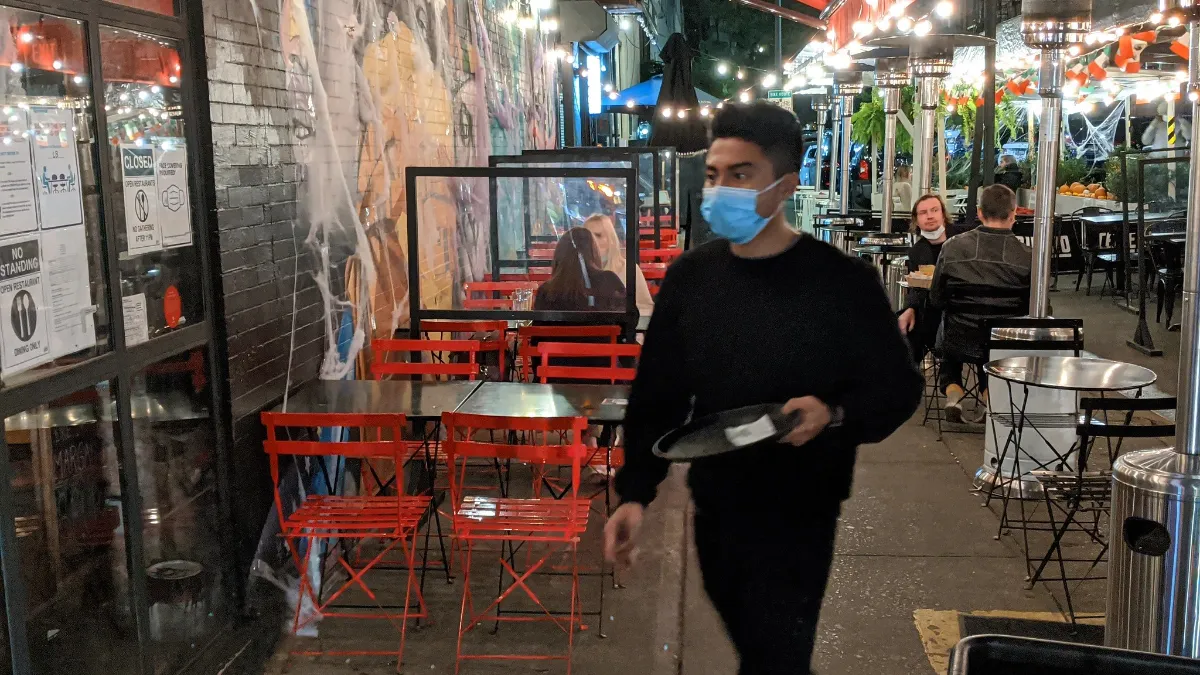Editor's note: This story has been updated to include a statement from the National Restaurant Association.
Dive Brief:
- Food services and drinking places lost 372,000 jobs in December, according to the Bureau of Labor Statistics employment report released Friday.
- These numbers are a dramatic increase from the 17,000 jobs lost at restaurants and bars in November, which marked the first time the industry had a net job loss since April. Leisure and hospitality unemployment is 157% higher than the national average, according to a press release from the Independent Restaurant Coalition emailed to Restaurant Dive.
- The restaurant industry ended 2020 with 2.5 million jobs less than pre-pandemic levels, according to the National Restaurant Association. The industry was expected to provide 12.3 million jobs during 2020, but ended the year at 9.8 million jobs.
Dive Insight:
While the latest jobless numbers are nowhere near the 5.5 million jobs lost in April 2020, they indicate a worsening trend for employment growth within the industry. The trend also aligns with the National Restaurant Association's November survey of restaurant owners that showed that only 5% of operators were planning to increase staffing levels over the subsequent three months.
Nine out of 10 full-service operators said staffing levels were lower compared to pre-pandemic levels, while 54% of family and casual dining and 62% of fine dining operators said their staffing levels were more than 20% below normal, according to the survey.
"Today's jobs numbers are devastating for our operators and our employees. The industry has nearly three times more unemployed workers than the next closest industry. As we go into 2021, the availability of the vaccine provides some hope, but it will be months before we start to see recovery for restaurants," Sean Kennedy, executive vice president of public affairs at the National Restaurant Association, said. "Owners — from small independents to franchisees — are doing everything they can to survive, but without help from all levels of government, the instability and chaos of the last ten months will continue for the nation's second largest private-sector employer."
The ongoing surge in coronavirus cases across the country, which has led to increased dining restrictions in many major cities and states, has helped spark a reversal in unemployment trends across the industry. As of early December, over 110,000 restaurants have permanently closed. But many of these job losses are likely temporary, as shown in the early months of the pandemic when the industry recovered about 3 million jobs during May and June out of the 5.5 million jobs lost in April, according to the NRA. A second round of Paycheck Protection Program loans worth $228 billion could also help companies pay to bring their staff back, but the Independent Restaurant Coalition say this isn't enough and continues to push for direct relief for the industry.
"New changes to the Paycheck Protection Program will be too little, too late for hundreds of thousands of people left without a paycheck this holiday season," the Independent Restaurant Coalition said in a statement. "The people who work in restaurants and bars are uniquely hurt by this pandemic, and don’t deserve it. ... Restaurants, bakeries, bars, and coffee shops employ more non-white managers and young people than any other industry. Immigrants, a million single mothers, and the formerly incarcerated rely on restaurants and bars for their livelihood. We cannot leave these communities jobless."
Even with many restaurant workers out of a job, those that are hiring are having trouble finding employees, such as what is occurring among Ohio restaurants. One restaurant that opened in December sought 40 to 45 employees, but only filled 25 positions, which delayed the restaurant's opening by two weeks, according to The Columbus Dispatch. An Ohio Restaurant Association survey also found that over one-third of operators were unable to fill open positions. Fears of coronavirus infection and unemployment benefits that have been paying more than what staff can earn on the jobs are complicating the rehiring situation, an ORA spokesperson told The Columbus Dispatch.










